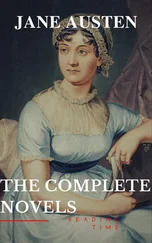“When do you write to Colonel Brandon, ma’am?” was an inquiry which sprung from the impatience of her mind to have something going on.
“I wrote to him, my love, last week, and rather expect to see, than to hear from him again. I earnestly pressed his coming to us, and should not be surprised to see him walk in today or tomorrow, or any day.”
This was gaining something, something to look forward to. Colonel Brandon must have some information to give.
Scarcely had she so determined it, when the figure of a man on horseback drew her eyes to the window. He stopt at their gate. It was a gentleman, it was Colonel Brandon himself. Now she could hear more; and she trembled in expectation of it. But — it was NOT Colonel Brandon — neither his air — nor his height. Were it possible, she must say it must be Edward. She looked again. He had just dismounted — she could not be mistaken — it WAS Edward. She moved away and sat down. “He comes from Mr. Pratt’s purposely to see us. I WILL be calm; I WILL be mistress of myself.”
In a moment she perceived that the others were likewise aware of the mistake. She saw her mother and Marianne change colour; saw them look at herself, and whisper a few sentences to each other. She would have given the world to be able to speak — and to make them understand that she hoped no coolness, no slight, would appear in their behaviour to him — but she had no utterance, and was obliged to leave all to their own discretion.
Not a syllable passed aloud. They all waited in silence for the appearance of their visitor. His footsteps were heard along the gravel path; in a moment he was in the passage, and in another he was before them.
His countenance, as he entered the room, was not too happy, even for Elinor. His complexion was white with agitation, and he looked as if fearful of his reception, and conscious that he merited no kind one. Mrs. Dashwood, however, conforming, as she trusted, to the wishes of that daughter, by whom she then meant in the warmth of her heart to be guided in every thing, met with a look of forced complacency, gave him her hand, and wished him joy.
He coloured, and stammered out an unintelligible reply. Elinor’s lips had moved with her mother’s, and, when the moment of action was over, she wished that she had shaken hands with him too. But it was then too late, and with a countenance meaning to be open, she sat down again and talked of the weather.
Marianne had retreated as much as possible out of sight, to conceal her distress; and Margaret, understanding some part, but not the whole of the case, thought it incumbent on her to be dignified, and therefore took a seat as far from him as she could, and maintained a strict silence.
When Elinor had ceased to rejoice in the dryness of the season, a very awful pause took place. It was put an end to by Mrs. Dashwood, who felt obliged to hope that he had left Mrs. Ferrars very well. In a hurried manner, he replied in the affirmative.
Another pause.
Elinor resolving to exert herself, though fearing the sound of her own voice, now said,
“Is Mrs. Ferrars at Longstaple?”
“At Longstaple!” he replied, with an air of surprise. — “No, my mother is in town.”
“I meant,” said Elinor, taking up some work from the table, “to inquire for Mrs. EDWARD Ferrars.”
She dared not look up — but her mother and Marianne both turned their eyes on him. He coloured, seemed perplexed, looked doubtingly, and, after some hesitation, said —
“Perhaps you mean — my brother — you mean Mrs. — Mrs. ROBERT Ferrars.”
“Mrs. Robert Ferrars!”— was repeated by Marianne and her mother in an accent of the utmost amazement — and though Elinor could not speak, even HER eyes were fixed on him with the same impatient wonder. He rose from his seat, and walked to the window, apparently from not knowing what to do; took up a pair of scissors that lay there, and while spoiling both them and their sheath by cutting the latter to pieces as he spoke, said, in a hurried voice,
“Perhaps you do not know — you may not have heard that my brother is lately married to — to the youngest — to Miss Lucy Steele.”
His words were echoed with unspeakable astonishment by all but Elinor, who sat with her head leaning over her work, in a state of such agitation as made her hardly know where she was.
“Yes,” said he, “they were married last week, and are now at Dawlish.”
Elinor could sit it no longer. She almost ran out of the room, and as soon as the door was closed, burst into tears of joy, which at first she thought would never cease. Edward, who had till then looked any where, rather than at her, saw her hurry away, and perhaps saw — or even heard, her emotion; for immediately afterwards he fell into a reverie, which no remarks, no inquiries, no affectionate address of Mrs. Dashwood could penetrate, and at last, without saying a word, quitted the room, and walked out towards the village — leaving the others in the greatest astonishment and perplexity on a change in his situation, so wonderful and so sudden — a perplexity which they had no means of lessening but by their own conjectures.
Unaccountable, however, as the circumstances of his release might appear to the whole family, it was certain that Edward was free; and to what purpose that freedom would be employed was easily pre-determined by all — for after experiencing the blessings of ONE imprudent engagement, contracted without his mother’s consent, as he had already done for more than four years, nothing less could be expected of him in the failure of THAT, than the immediate contraction of another.
His errand at Barton, in fact, was a simple one. It was only to ask Elinor to marry him — and considering that he was not altogether inexperienced in such a question, it might be strange that he should feel so uncomfortable in the present case as he really did, so much in need of encouragement and fresh air.
How soon he had walked himself into the proper resolution, however, how soon an opportunity of exercising it occurred, in what manner he expressed himself, and how he was received, need not be particularly told. This only need be said — that when they all sat down to table at four o’clock, about three hours after his arrival, he had secured his lady, engaged her mother’s consent, and was not only in the rapturous profession of the lover, but, in the reality of reason and truth, one of the happiest of men. His situation indeed was more than commonly joyful. He had more than the ordinary triumph of accepted love to swell his heart, and raise his spirits. He was released without any reproach to himself, from an entanglement which had long formed his misery, from a woman whom he had long ceased to love — and elevated at once to that security with another, which he must have thought of almost with despair, as soon as he had learnt to consider it with desire. He was brought, not from doubt or suspense, but from misery to happiness — and the change was openly spoken in such a genuine, flowing, grateful cheerfulness, as his friends had never witnessed in him before.
His heart was now open to Elinor, all its weaknesses, all its errors confessed, and his first boyish attachment to Lucy treated with all the philosophic dignity of twenty-four.
“It was a foolish, idle inclination on my side,” said he, “the consequence of ignorance of the world — and want of employment. Had my brother given me some active profession when I was removed at eighteen from the care of Mr. Pratt, I think — nay, I am sure, it would never have happened; for though I left Longstaple with what I thought, at the time, a most unconquerable preference for his niece, yet had I then had any pursuit, any object to engage my time and keep me at a distance from her for a few months, I should very soon have outgrown the fancied attachment, especially by mixing more with the world, as in such case I must have done. But instead of having any thing to do, instead of having any profession chosen for me, or being allowed to chuse any myself, I returned home to be completely idle; and for the first twelvemonth afterwards I had not even the nominal employment, which belonging to the university would have given me; for I was not entered at Oxford till I was nineteen. I had therefore nothing in the world to do, but to fancy myself in love; and as my mother did not make my home in every respect comfortable, as I had no friend, no companion in my brother, and disliked new acquaintance, it was not unnatural for me to be very often at Longstaple, where I always felt myself at home, and was always sure of a welcome; and accordingly I spent the greatest part of my time there from eighteen to nineteen: Lucy appeared everything that was amiable and obliging. She was pretty too — at least I thought so THEN; and I had seen so little of other women, that I could make no comparisons, and see no defects. Considering everything, therefore, I hope, foolish as our engagement was, foolish as it has since in every way been proved, it was not at the time an unnatural or an inexcusable piece of folly.”
Читать дальше












